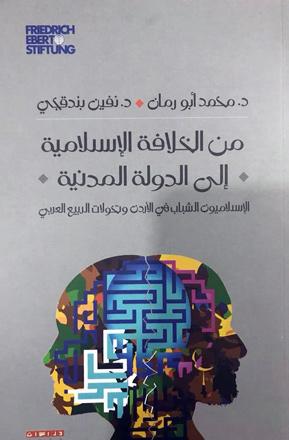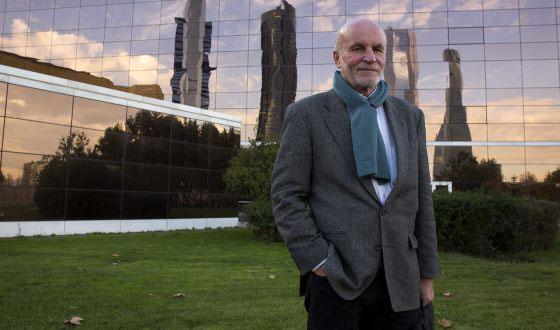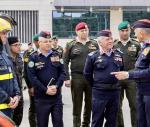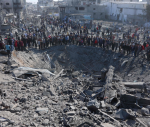You are here
Role of political Islam in post-’Arab Spring’ region discussed
By Laila Azzeh - May 25,2017 - Last updated at May 25,2017

Zaki Bani Irsheid, Nabil Kofahi, Ghaith Qudah and researcher Neveen Bondokji discuss the future of political Islam during a regional conference organised by Friedrich Ebert Stifting in Amman on Tuesday (Photo courtesy of Friedrich Ebert Stifting)
AMMAN – The future of political Islam in the region in light of the unrest facing several Arab countries was the focus of a conference organised by Friedrich Ebert Stiftung on Tuesday.
Participants at the gathering, titled “The Future of Political Islam in a Turbulent Region”, discussed their countries’ experience in witnessing the rise of Islamic movements, from the past until the current “post-Arab Spring” era.
While the panelists from Jordan, Egypt, Kuwait, Iraq, Morocco, Algeria and Tunisia shed light on their countries’ different experiences with political Islam, they all agreed that Islamic movements in the region lacked the “maturity” that enables them to have an influential role in the aftermath of the Arab Spring.
“The vast majority of reviews carried out by the Islamic movement, and the repositioning process it went through after the Arab Spring, were neither genuine nor based on a clear methodology, but rather a response to different regional or local political pressures,” noted Ghaith Qudah, a former member of the Islamic Action Front in Jordan and a founding member of the Partnership and Rescue Party.
“The Muslim Brotherhood, and I was a member of the organisation for more than 30 years, is based on archaic principles that have not been changed since they were formulated by its founder, Hassan Al Bana,” he said, adding that the party has “no clear definition of the state and remained a prisoner to an old discourse, that did not go through a process of criticism or development”.
Qudah highlighted that this has prompted members of the Muslim Brotherhood to form civil and national initiatives, such as the Partnership and Rescue Party and the National Building Initiative (Zamzam).
Nabil Kofahi, founder of Zamzam, underlined that the initiative was launched in 2012 in order to introduce proposals that address the contemporary challenges facing Jordan.
“Zamazam has adopted a separation between what is considered religious advocacy and political activities, adopting the concept of the civil state that embraces citizens from different political and ideological backgrounds,” he said.
The overall leader of the Muslim Brotherhood in Jordan, Zaki Bani Irsheid, underlined that the movement today is very different from the past, stressing that processes of self-critique and review are “crucial and healthy”.
“I don’t think the Muslim Brotherhood is going to vanish or that it is time to speak about a ‘post- political Islam’ era. The Arab Spring didn’t only seek to change regimes, but it also reflected a lust for liberty, accompanied by [struggles against] social injustice and oppression,” he said.
To this end, Bani Irsheid continued, there is a need for all parties or movements with a vision for reform and change to take part in the transition.
“We at the Muslim Brotherhood redrew our relationship with the political regime and made internal transformations. We would like to remind everyone that up until now, no other alternative parties have arisen in Jordan with the same level of organisation as the Muslim Brotherhood,” he noted. “However, we can say today that the movement is under a second state of construction,” he continued.
Participants from across the Middle East and North Africa cited their own countries’ experiences of the growth of political Islam.
“The Arab revolutions are considered a substantial transformation for Islamic movements, who went through two eras of transition; one between 2011 and 2013, and the other from 2013 to 2017,” said researcher Mohammad Abu Rumman.
He tracked several transformations in the approaches of Islamic movements, but underlined that the primary transformation was the move from its traditional social and ideological roles, to a political role.
For Francois Burgat, senior research fellow at the French National Centre for Scientific Research, the experience of political Islam differs from country to country, based on their leaderships, relationships with regimes and institutions, as well as regional and international politics.
“It is unscientific to speak about political Islam as having one reference…,” he said, adding that extremists have always been playing on the margins of the political scenes in the region, but that they started to take central positions since the US invasion and occupation of Iraq, followed by the crisis in Syria.
“Somehow, these movements are going through a very natural process, or doing politics as usual, in response to the western and colonial interventions in the region,” Burgat concluded.
Related Articles
AMMAN — The Arab Spring and the internal disputes inside the Muslim Brotherhood organisation have brought about ideological changes to the c
AMMAN — “Never in our recent history [has] the gap between the politically correct discourse about political Islam in France and in the Arab
Leaders of Zamzam, a reform initiative, on Wednesday said they have officially launched three associations, one of which is of a political mission that has been licensed by the Ministry of Political and Parliamentary Affairs.

















